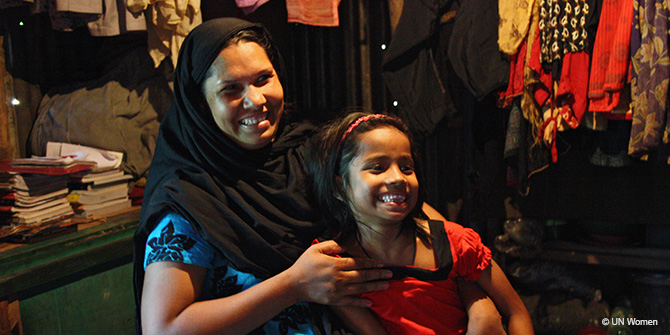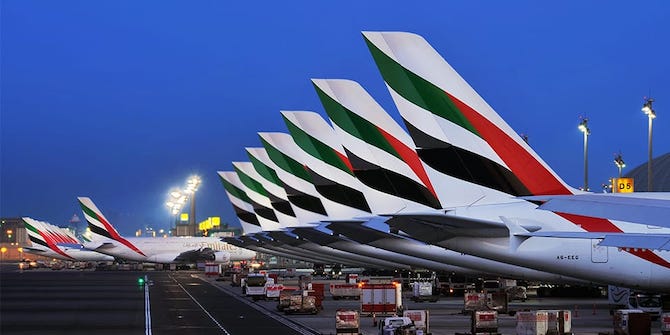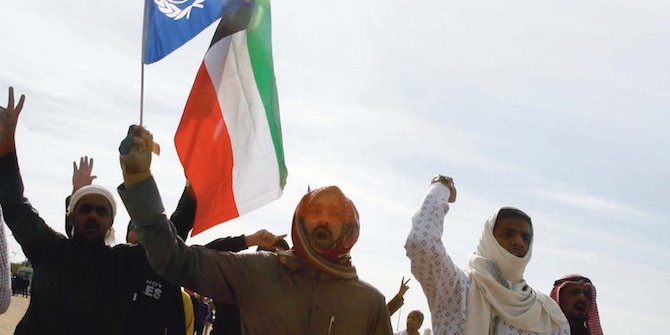by Karen E. Young
This memo was presented at a workshop organised by the LSE Middle East Centre and the UAE National Defense College on 12 January 2016.

There is one area that is particularly vexing for research on the resource-curse: the persistent relationship with patriarchy and the exclusion of women from both political and economic participation. Michael Ross has argued that petroleum wealth in particular perpetuates patriarchy. His argument is that the traditional inclusion of women into low-wage and low-tech employment (specifically manufacturing) has been impossible in petro-states that forgo a manufacturing industrialisation process, blocking the path of women’s political and economic empowerment (reinforced with cultural taboos). Women’s labour force participation has the advantage of ‘boosting’ political influence through three levels, according to Ross: 1) at the individual level by changing identities and social roles in the family, 2) at the social level by bringing women together in the workplace to foster political networking, and 3) at the level of the national economy with purchasing power from their independent earnings, making them visible to policymakers.
The comparative politics literature, particularly work by Nancy Burns, Kay Lehman Schlozman and Sidney Verba, on women’s participation and political empowerment supports the idea that women’s early labor participation, cross-nationally, has some important patterns. Manufacturing has allowed women to take jobs that require little physical strength, lower wages that do not compete with men, and therefore created political spaces for women’s political organising. Ross gives the case example of South Korea’s economic liberalisation of the 1980s in which women took on manufacturing roles and then widened political participation within a traditionally patriarchal culture. How might we examine the variable of women’s labour participation in Gulf states, in both citizen and migrant populations, to try and understand any relationship between economic diversification and women’s inclusion in political and economic life?
Are the states that have made more progress in women’s participation in the labour force also those with better political participation opportunities for women? Is there a commonality between migrant and citizen women in the workforce, or is there a negative relationship in which the dominance of low wage employment of migrant women (particularly in entry-level employment of manufacturing and retail) further enforces a patriarchal political economy? How are migrant women dominant in certain sectors of employment and how might this affect citizen women’s ability to penetrate higher-wage/higher-qualification employment (and subsequent political networking opportunities)?
With data from the Gulf Labour Markets and Migration project (GLMM) we have begun a preliminary survey of women’s labour participation in both citizen and migrant populations by country across the GCC. There are some interesting, and I stress, preliminary findings:
Female migrant populations can be targeted by nationality, that is, by invitation of the host country. In the case of the UAE, for example, there is only one Arab migrant female population in which women migrants outnumber their countrymen: Moroccan migrants.
The proportions of unemployed ‘non-active’ (those not seeking work) women by age group tend to coincide among migrant and citizen populations in some GCC states. That is, we are seeing a cultural ‘housewife’ phenomena (especially ages 30-49) that transcends migrant/citizen divides. Is the ‘trailing spouse’ among migrant populations further contributing to the perpetuation of patriarchy in Gulf political economies? If there were more policies to put migrant women to work, might we expect a similar cultural effect among citizens?
Men outnumber women in population and workforce in much of the GCC. In places where the numbers are more balanced, we do see better indications of women’s political and economic participation, e.g. Kuwait. In Kuwait, there are 114 men per 100 employed women nationals; 313 men per 100 employed non-nationals. Compare that to Saudi Arabia, in which there are 548 men per 100 employed female nationals and 798 men per 100 employed non-national women (GLMM, 2013 national institutes of statistics).
Public sector jobs are areas where Gulf national females are accelerating their presence in the workforce, often at much higher proportions to non-national females. In Qatar, for example, from the Annual Bulletin of Labor Force Survey of 2011, we see that in public administration and defense 1 in 3 national employees is female, while 1 in 10 non-nationals employed in that sector are female. Also in professional, scientific and technical professions male and female nationals are nearly equally employed, while non-national women are employed by 1 in 20 non-national men in that sector.
In an era of economic reform and increasing attention to labour markets in the Gulf, we have an opportunity to investigate some of the variation among Gulf states in their approaches to outsiders, by nationality, age and gender. Demonstrating that public policy choices about migration and controlling labour importation have important social effects, and the potential to influence development outcomes, could be especially valuable for policymakers in the GCC now.
 Dr Karen Young is a senior resident scholar at the Arab Gulf States Institute in Washington. She was research fellow at the LSE Middle East Centre from 2014-15, where she remains a visiting fellow. From 2009-14, she was assistant professor of political science at the American University of Sharjah (UAE).
Dr Karen Young is a senior resident scholar at the Arab Gulf States Institute in Washington. She was research fellow at the LSE Middle East Centre from 2014-15, where she remains a visiting fellow. From 2009-14, she was assistant professor of political science at the American University of Sharjah (UAE).
Other memos presented at the workshop:
- Cutting out the Middle Man: GCC Economic Strategies for Tackling Migration Racketeering
by Omar Al-Ubaydli
- Neoliberal Citizenship: The Transformation of Belonging
by Kevin W. Gray
- Globalisation and Human Trafficking: The GCC and the Rest
by Samuel R. Greene and Nathan W. Toronto







1 Comments